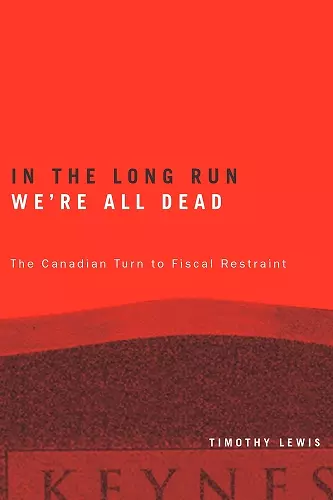In the Long Run We're All Dead
The Canadian Turn to Fiscal Restraint
Format:Hardback
Publisher:University of British Columbia Press
Published:16th May '03
Currently unavailable, and unfortunately no date known when it will be back

In The Long Run We’re All Dead: The Canadian Turn to Fiscal Restraint addresses how the decline of Canadian Keynesianism has made way for the emergence of politics organized around balanced budgets.
A superb analysis of how the decline of Canadian Keynesianism has made way for the emergence of politics organized around balanced budgets.
Canadian politics in the 1990s were characterized by an unwavering focus on the deficit. At the beginning of the decade, it seemed that fiscal deficits were intractable – a fait accompli of Canadian politics – yet by the end of the decade, Ottawa had taken remarkable actions to eliminate its budgetary shortfalls and had successfully eradicated its deficits. How such a radical change of political course came to pass is still not well understood.
In The Long Run We’re All Dead: The Canadian Turn to Fiscal Restraint offers the first comprehensive scholarly account of this vital public policy issue. Lewis deftly analyzes the history of deficit finance from before Confederation through Canada’s postwar Keynesianism to the retrenchment of the Mulroney and Chrétien years. In doing so, he illuminates how the political conditions for Ottawa’s deficit elimination in the 1990s materialized after over 20 consecutive years in the red, and how the decline of Canadian Keynesianism has made way for the emergence of politics organized around balanced budgets.
This important book provides scholars and students of Canadian politics with a new framework by which to understand the adoption of government policy, the economic and fiscal legacy of the Mulroney administrations, and the emergence of the new “politics of the surplus.” It will be of great interest to those engaged with Canadian politics, political economy, and public policy, as well as to participants in policy processes and the informed public.
Not long ago, deficits were seen as positive things in Canada. Now deficits are seen as evil. Timothy Lewis has just published a fascinating book which traces the transformations of Canadian attitudes. [It] is an illuminating account of the interaction between ideas and politics, between economic theories and political limitations, possibilities or necessities." -- Graham Fraser * Toronto Star *
A thoughtful, detailed analysis of deficit politics and its relationship to the role of ideas in shaping both public policies and public perceptions of them ...[It is] an effective teaching and analytical tool for instructors and students of public policy. -- Geoffrey Hale * Canadian Journal of Political Science *
ISBN: 9780774809986
Dimensions: unknown
Weight: 540g
288 pages